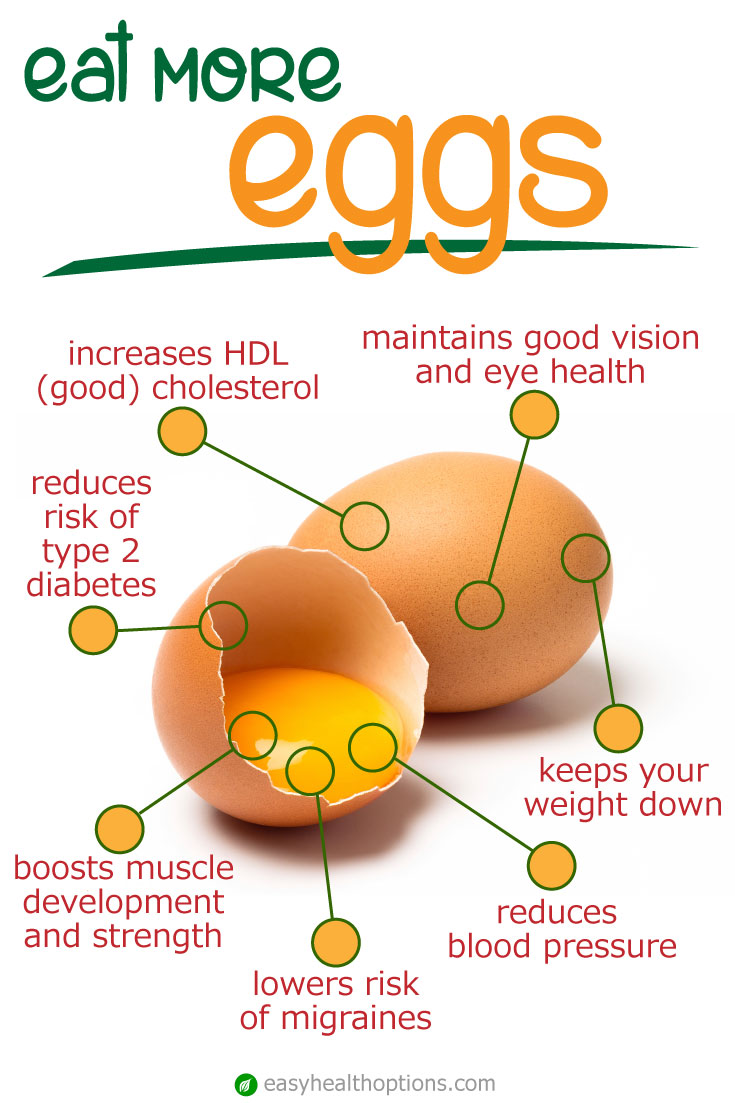Get Easy Health Digest™ in your inbox and don’t miss a thing when you subscribe today. Plus, get the free bonus report, Mother Nature’s Tips, Tricks and Remedies for Cholesterol, Blood Pressure & Blood Sugar as my way of saying welcome to the community!
If you skip the yolks, the jokes on you

You’ve long been told that eggs, particularly the yolks, are not the healthiest food you can eat.
You’ve heard it all… how they are high in cholesterol and increase your risk of heart disease.
What if the truth is actually the opposite… that eggs are one of the healthiest foods you can eat. And, that eating eggs not only produces more healthy cholesterol your body needs, but protects against heart disease, too.
Surprised? I don’t blame you. We were all duped…
One of the biggest nutrition myths is that the cholesterol in foods you eat automatically equates to higher cholesterol levels in your body. That’s not what happens at all.
Your liver produces cholesterol internally and it may come as a further surprise to learn that things like sugar and excess carbohydrates promote more cholesterol production that an egg ever would, if it could.
In fact, it’s time to forget about the whole cholesterol myth because cholesterol very poorly correlates with heart attack risk — but eggs equate to loads of health benefits…
Eggs are highly nutritious
Eggs are a misunderstood food. Yes, they do contain 170-200 mg of cholesterol and 5 g of fat (1.5 g saturated, the rest monounsaturated). But they also contain high quality protein, vitamins A, B12, D and folate, choline, lutein, zeaxanthin, and arginine — with most of these beneficial nutrients contained in the yolk!
 Just one egg contains way more nutrients than commonly promoted ‘healthy breakfast options — namely, cereals. In fact, compared to eating oatmeal, eating two eggs for breakfast shows no difference on cholesterol levels but has a direct influence on your hunger hormone ghrelin, which improves your satiety (feeling of fullness and satisfaction) and increases your antioxidant status as well.
Just one egg contains way more nutrients than commonly promoted ‘healthy breakfast options — namely, cereals. In fact, compared to eating oatmeal, eating two eggs for breakfast shows no difference on cholesterol levels but has a direct influence on your hunger hormone ghrelin, which improves your satiety (feeling of fullness and satisfaction) and increases your antioxidant status as well.
So if you’ve been giving up eggs for this very wrong reason, you’ve really been missing out.
Egg research disproves bad rap
To measure benefits for cardiovascular disease, researchers often examine the ability of a food to decrease triglycerides and LDL cholesterol (the bad stuff), increase levels of HDL cholesterol (the good stuff) and lower the LDL/ HDL ratio.
Here’s a brief overview of what they saw with eggs…
When people maintained their normal diet but ate more eggs (1-3 eggs per day), their LDL cholesterol reduced by 10.9 percent, HDL increased by 4.4 percent and they had a 7.7+ percent lower LDL/ HDL ratio. They also showed higher levels of vitamin D, choline, and selenium and a 20-31 percent increase in lutein and zeaxanthin.
Conclusion: There were no changes in biomarkers related to cardiovascular risk.
In a 3-month trial with 140 type 2 diabetic participants — who are at much greater risk of heart disease — eating 2 eggs per day, 6 days per week showed no changes.
Conclusion: Eating eggs everyday does not increase cardiovascular risk in type 2 diabetics.
In another study, adults who already had coronary artery disease were given three different breakfasts — two eggs, ½ cup eggbeaters, or a high carb oatmeal breakfast. Guess which breakfast had better overall outcomes? Yep, the daily egg breakfast!
Conclusion: In patients with coronary artery disease, daily egg consumption does not increase cardiac risk factors.
This is just the tip of the iceberg but as you can see, there’s nothing, health-wise at least, holding your back from enjoying your eggs — and those delicious golden yolks.
Editor’s note: While you’re doing all the right things to protect your brain as you age, make sure you don’t make the mistake 38 million Americans do every day — by taking a drug that robs them of an essential brain nutrient! Click here to discover the truth about the Cholesterol Super-Brain!
Sources:
-
Missimer A, et al. Consuming Two Eggs per Day, as Compared to an Oatmeal Breakfast, Increases Plasma Ghrelin while Maintaining the LDL/HDL Ratio. Nutrients. 2017;9(2).
-
DiMarco DM, et al. Intake of up to 3 Eggs/Day Increases HDL Cholesterol and Plasma Choline While Plasma Trimethylamine-N-oxide is Unchanged in a Healthy Population. Lipids. 2017.
-
Kishimoto Y, et al. The Effect of the Consumption of Egg on Serum Lipids and Antioxidant Status in Healthy Subjects. J Nutr Sci Vitaminol (Tokyo). 2016;62(5):361-5.
-
Fuller NR, et al. Egg Consumption and Human Cardio-Metabolic Health in People with and without Diabetes. Nutrients. 2015;7(9):7399-420.
-
Fuller NR, et al. The effect of a high-egg diet on cardiovascular risk factors in people with type 2 diabetes: the Diabetes and Egg (DIABEGG) study-a 3-mo randomized controlled trial. Am J Clin Nutr. 2015;101(4):705-13.












